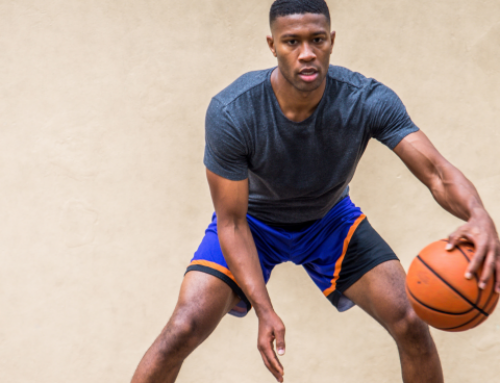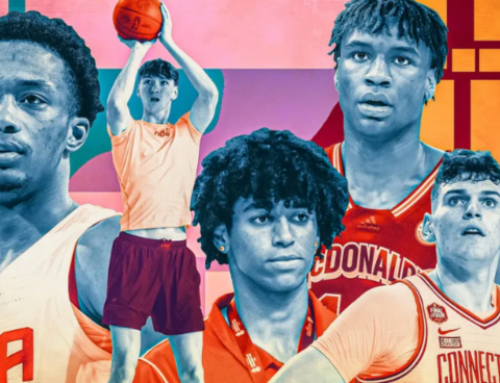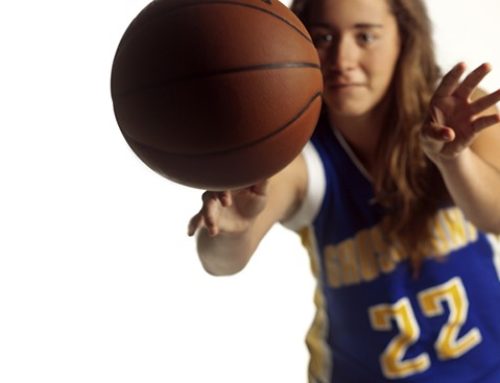These Three Words Helped Ben Simmons Stay Focused During His Rehab
It’s been 455 days since the Philadelphia 76ers made Ben Simmons the No. 1 pick in the 2016 NBA Draft.
He has yet to play a single minute.
Last September, during the Sixers’ final scrimmage of training camp, Simmons suffered a fractured metatarsal in his right foot. The injury sidelined him for the entire 2016-2017 season, and the Sixers finished with the fourth-worst record in the NBA.
Simmons went from “the next LeBron James” to a punchline about the Sixers’ seemingly never-ending rebuild. However, he handled the situation with surprising tranquility. He didn’t criticize his team. He didn’t take out his frustration with excessive partying. He didn’t sulk and feel sorry for himself. He simply focused on his rehab and did what he could to work on his game.
If you ask him about the injury nowadays, Simmons is quick to point out the positives.
“I’ve had a whole year to grow and learn and focus on what I need to focus on. I think that whole year has really helped me,” Simmons recently told ESPN. “(It helped with) learning the game, scoring, defense … everything.”
How was Simmons, who turned 21 in July, able to handle a disappointing time with so much poise?
As it turns out, Simmons is well equipped to endure adversity. Much of that has to do with mental skills training coach Graham Betchart. Betchart, who has a Master’s degree in sports psychology, has also worked with the likes of Andrew Wiggins, Karl-Anthony Towns and Aaron Gordon. He first met Simmons at the NBPA Top 100 Basketball Camp in 2011. The two worked together closely as Simmons transitioned from prized recruit at Montverde Academy (Montverde, Florida) to freshman phenom at Louisiana State University.
One of Betchart’s key concepts is WIN (short for “What’s Important Now?”). Simmons found this concept to be tremendously helpful as he navigated his newfound fame and the enormous pressures that came with it.
“(WIN) gets you into what’s in your control. You can’t control results and outcomes. So the first thing we try to do is let go of this obsession of focusing on results and outcomes. Take that incredible drive you have and focus on the things you can control. Focus on attitude, focus on effort, focus on your focus. Train yourself to be in the moment and focus on the task at hand,” Betchart tells STACK. “That’s the foundation for everything. Let’s get your focus on what you can control. That eliminates about 95% of what people are thinking about.”
Simmons faced massive scrutiny over his decision to attend LSU instead of a traditional college basketball powerhouse. “When he went to Baton Rouge, people thought he was a disaster. ‘He should’ve gone to Kentucky! Why are you going there? You’re throwing your life away!’” Betchart says. “He had to learn to make peace with that. The thing that really helped him was WIN. Be calm in the chaos—it’s about being the eye of the hurricane. There’s going to be chaos around you. Don’t try to stop that. Learn to get calm in the middle of it. He really bought into that at LSU and it helped him out a lot.”
Having that strong foundation of mental skills training proved to be invaluable for Simmons. Betchart believes mental skills—like physical skills—need time and repetition before they can truly take hold. “The earlier I can introduce this stuff to them and the earlier they can start practicing, the better,” Betchart says. “Let’s train people instead of saving people. I think a lot of people come into mental training when they have a crisis. I want to make it so you just do mental training because it’s what you’re supposed to do—not because you’re going through a crisis.”
Had Simmons first began his mental training after his injury, the last 12 months might’ve not gone so smoothly. Instead, he now finds himself healthy and primed to help the 76ers to a potentially historic turnaround. He grew 2 inches during his rehab (he now measures nearly 7-feet tall) and his once “broken jumper” is looking silky smooth.
“Injuries happen. That’s part of being an athlete. He can’t control if someone in Philadelphia thinks he’s the savior of basketball or if someone thinks he’s the worst thing ever. What I’ve noticed with Ben is he’s pretty relaxed. As he’s gone through this whole experience, he’s at peace. He’s still your typical 21-year-old, he’s taking pictures of cats and putting them online and doing silly stuff,” Betchart says. “But he’s pretty relaxed with all the stuff he can’t control and he just kinda rolls with it. It doesn’t derail him.”
If you’re interested in Betchart’s brand of mental skills training, take a look at the Lucid app. Betchart serves as the director of mental training at Lucid, and the app includes the same concepts and techniques he uses with pro athletes. Even better? It only takes five minutes a day.
Photo Credit: Nathaniel S. Butler/Getty Images
READ MORE:
RECOMMENDED FOR YOU
MOST POPULAR
These Three Words Helped Ben Simmons Stay Focused During His Rehab
It’s been 455 days since the Philadelphia 76ers made Ben Simmons the No. 1 pick in the 2016 NBA Draft.
He has yet to play a single minute.
Last September, during the Sixers’ final scrimmage of training camp, Simmons suffered a fractured metatarsal in his right foot. The injury sidelined him for the entire 2016-2017 season, and the Sixers finished with the fourth-worst record in the NBA.
Simmons went from “the next LeBron James” to a punchline about the Sixers’ seemingly never-ending rebuild. However, he handled the situation with surprising tranquility. He didn’t criticize his team. He didn’t take out his frustration with excessive partying. He didn’t sulk and feel sorry for himself. He simply focused on his rehab and did what he could to work on his game.
If you ask him about the injury nowadays, Simmons is quick to point out the positives.
“I’ve had a whole year to grow and learn and focus on what I need to focus on. I think that whole year has really helped me,” Simmons recently told ESPN. “(It helped with) learning the game, scoring, defense … everything.”
How was Simmons, who turned 21 in July, able to handle a disappointing time with so much poise?
As it turns out, Simmons is well equipped to endure adversity. Much of that has to do with mental skills training coach Graham Betchart. Betchart, who has a Master’s degree in sports psychology, has also worked with the likes of Andrew Wiggins, Karl-Anthony Towns and Aaron Gordon. He first met Simmons at the NBPA Top 100 Basketball Camp in 2011. The two worked together closely as Simmons transitioned from prized recruit at Montverde Academy (Montverde, Florida) to freshman phenom at Louisiana State University.
One of Betchart’s key concepts is WIN (short for “What’s Important Now?”). Simmons found this concept to be tremendously helpful as he navigated his newfound fame and the enormous pressures that came with it.
“(WIN) gets you into what’s in your control. You can’t control results and outcomes. So the first thing we try to do is let go of this obsession of focusing on results and outcomes. Take that incredible drive you have and focus on the things you can control. Focus on attitude, focus on effort, focus on your focus. Train yourself to be in the moment and focus on the task at hand,” Betchart tells STACK. “That’s the foundation for everything. Let’s get your focus on what you can control. That eliminates about 95% of what people are thinking about.”
Simmons faced massive scrutiny over his decision to attend LSU instead of a traditional college basketball powerhouse. “When he went to Baton Rouge, people thought he was a disaster. ‘He should’ve gone to Kentucky! Why are you going there? You’re throwing your life away!’” Betchart says. “He had to learn to make peace with that. The thing that really helped him was WIN. Be calm in the chaos—it’s about being the eye of the hurricane. There’s going to be chaos around you. Don’t try to stop that. Learn to get calm in the middle of it. He really bought into that at LSU and it helped him out a lot.”
Having that strong foundation of mental skills training proved to be invaluable for Simmons. Betchart believes mental skills—like physical skills—need time and repetition before they can truly take hold. “The earlier I can introduce this stuff to them and the earlier they can start practicing, the better,” Betchart says. “Let’s train people instead of saving people. I think a lot of people come into mental training when they have a crisis. I want to make it so you just do mental training because it’s what you’re supposed to do—not because you’re going through a crisis.”
Had Simmons first began his mental training after his injury, the last 12 months might’ve not gone so smoothly. Instead, he now finds himself healthy and primed to help the 76ers to a potentially historic turnaround. He grew 2 inches during his rehab (he now measures nearly 7-feet tall) and his once “broken jumper” is looking silky smooth.
“Injuries happen. That’s part of being an athlete. He can’t control if someone in Philadelphia thinks he’s the savior of basketball or if someone thinks he’s the worst thing ever. What I’ve noticed with Ben is he’s pretty relaxed. As he’s gone through this whole experience, he’s at peace. He’s still your typical 21-year-old, he’s taking pictures of cats and putting them online and doing silly stuff,” Betchart says. “But he’s pretty relaxed with all the stuff he can’t control and he just kinda rolls with it. It doesn’t derail him.”
If you’re interested in Betchart’s brand of mental skills training, take a look at the Lucid app. Betchart serves as the director of mental training at Lucid, and the app includes the same concepts and techniques he uses with pro athletes. Even better? It only takes five minutes a day.
Photo Credit: Nathaniel S. Butler/Getty Images
READ MORE:











